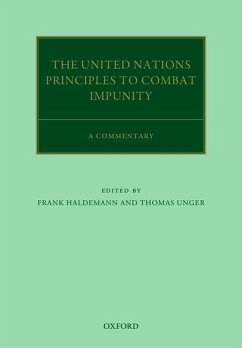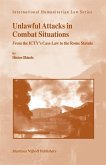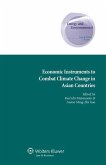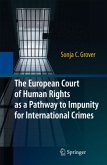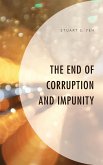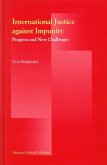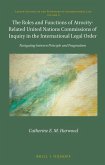- Gebundenes Buch
- Merkliste
- Auf die Merkliste
- Bewerten Bewerten
- Teilen
- Produkt teilen
- Produkterinnerung
- Produkterinnerung
Bringing together leading experts in the field, this volume provides comprehensive academic commentary on the UN Principles to Combat Impunity. The book features the text of each of the 38 Principles, along with a full analysis, detailed commentary, and a guide to relevant literature and case law.
Andere Kunden interessierten sich auch für
![Twilight of Impunity Twilight of Impunity]() Judith ArmattaTwilight of Impunity114,99 €
Judith ArmattaTwilight of Impunity114,99 €![Unlawful Attacks in Combat Situations Unlawful Attacks in Combat Situations]() Héctor OlásoloUnlawful Attacks in Combat Situations209,99 €
Héctor OlásoloUnlawful Attacks in Combat Situations209,99 €![Economic Instruments to Combat Climate Change in Asian Countries Economic Instruments to Combat Climate Change in Asian Countries]() Economic Instruments to Combat Climate Change in Asian Countries184,99 €
Economic Instruments to Combat Climate Change in Asian Countries184,99 €![The European Court of Human Rights as a Pathway to Impunity for International Crimes The European Court of Human Rights as a Pathway to Impunity for International Crimes]() Sonja C. GroverThe European Court of Human Rights as a Pathway to Impunity for International Crimes81,99 €
Sonja C. GroverThe European Court of Human Rights as a Pathway to Impunity for International Crimes81,99 €![The End of Corruption and Impunity The End of Corruption and Impunity]() Stuart S. YehThe End of Corruption and Impunity155,99 €
Stuart S. YehThe End of Corruption and Impunity155,99 €![International Justice Against Impunity International Justice Against Impunity]() Yves BeigbederInternational Justice Against Impunity167,99 €
Yves BeigbederInternational Justice Against Impunity167,99 €![The Roles and Functions of Atrocity-Related United Nations Commissions of Inquiry in the International Legal Order The Roles and Functions of Atrocity-Related United Nations Commissions of Inquiry in the International Legal Order]() Catherine HarwoodThe Roles and Functions of Atrocity-Related United Nations Commissions of Inquiry in the International Legal Order239,99 €
Catherine HarwoodThe Roles and Functions of Atrocity-Related United Nations Commissions of Inquiry in the International Legal Order239,99 €-
-
-
Bringing together leading experts in the field, this volume provides comprehensive academic commentary on the UN Principles to Combat Impunity. The book features the text of each of the 38 Principles, along with a full analysis, detailed commentary, and a guide to relevant literature and case law.
Hinweis: Dieser Artikel kann nur an eine deutsche Lieferadresse ausgeliefert werden.
Hinweis: Dieser Artikel kann nur an eine deutsche Lieferadresse ausgeliefert werden.
Produktdetails
- Produktdetails
- Verlag: Oxford University Press (UK)
- Seitenzahl: 474
- Erscheinungstermin: 22. Mai 2018
- Englisch
- Abmessung: 251mm x 179mm x 38mm
- Gewicht: 974g
- ISBN-13: 9780198743606
- ISBN-10: 0198743602
- Artikelnr.: 48741445
- Herstellerkennzeichnung
- Libri GmbH
- Europaallee 1
- 36244 Bad Hersfeld
- gpsr@libri.de
- Verlag: Oxford University Press (UK)
- Seitenzahl: 474
- Erscheinungstermin: 22. Mai 2018
- Englisch
- Abmessung: 251mm x 179mm x 38mm
- Gewicht: 974g
- ISBN-13: 9780198743606
- ISBN-10: 0198743602
- Artikelnr.: 48741445
- Herstellerkennzeichnung
- Libri GmbH
- Europaallee 1
- 36244 Bad Hersfeld
- gpsr@libri.de
Frank Haldemann is the Co-Director of the Master of Advanced Studies in Transitional Justice, Human Rights and the Rule of Law at the Geneva Academy of International Humanitarian Law and Human Rights. Since 2010 he has been teaching Transitional Justice within the Geneva Academys various programmes. From June 2011 to July 2017, he was Assistant Professor at the Law Faculty, University of Geneva. In 2011 he was awarded a Swiss National Science Foundation Professorship, enabling him to direct a five-year research project on Historical Injustices, Reparations and International Law. Thomas Unger is a researcher on transitional justice at the Geneva Academy and Co-Director of the Master of Advanced Studies in Transitional Justice, Human Rights and the Rule of Law. He is the former Senior Adviser to the UN Special Rapporteur on the promotion of truth, justice, reparation and guarantees of non-recurrence.
* Prologue
* Introduction
* I.
* Preamble
* II. Definitions
* III.
* Combating Imputiny: General Obligation
* IV.
* The Right to Know
* A. General Principles
* Principle 2: The inalienable right to the truth
* Principle 3: The duty to preserve memoryPrinciple 4: The victimsâ
right to know
* Principle 5: Guarantees to give effect to the right to know
* B. Commissions of Inquiry
* Principle 6: The establishment and role of truth commissions
* Principle 7: Guarantees of independence, impartiality and competence
* Principle 8: Definition of a commissionâs terms of reference
* Principle 9: Guarantees for persons implicated
* Principle 10: Guarantees for victims and witnesses testifying on
their behalf
* Principle 11: Adequate resources for commissions
* Principle 12: Advisory functions of the commissionsPrinciple 13:
Publicizing the commissionâs reports
* C. Preservation of and Access to Archives Bearing Witness to
Violations
* Principle 14: Measures for the preservation of archivesPrinciple 15:
Measures for facilitating access to archives
* Principle 16: Cooperation between archive departments and the courts
and non-judicial commissions of inquiry
* Principle 17: Specific measures relating to archives containing names
* Principle 18: Specific measures related to the restoration of or
transition to democracy and/or peace
* V. The Right to Justice
* A. General Principles
* Principle 19: Duties of States with regard to the administration of
justice
* B. Distribution of Jurisdiction Between National, Foreign,
International and Internationalized Courts
* Principle 20: Jurisdiction of international and internationalized
criminal tribunals
* Principle 21: Measures for strengthening the effectiveness of
international legal Principles concerning universal and international
jurisdiction
* C. Restrictions on Rules of Law Justified by Action to Combat
Impunity
* Principle 22: Nature of restrictive measures
* Principle 23: Restrictions on prescription
* Principle 24: Restrictions and other measures relating to amnesty
* Principle 25: Restrictions on the right of asylum
* Principle 26: Restrictions on extradition/non bis in idem
* Principle 27: Restrictions on justifications related to due
obedience, superior responsibility, and official status
* Principle 28: Restrictions on the effects of legislation on
disclosure or repentance
* Principle 29: Restrictions on the jurisdiction of military courts
* Principle 30: Restrictions on the Principle of the irremovability of
judges
* VI.
* The Right to Reparation/Guarantees of Non-Recurrence A. The Right to
Reparation
* Principle 31: Rights and duties arising out of the obligation to make
reparation
* Principle 32: Reparation procedures
* Principle 33: Publicizing reparation procedures
* Principle 34: Scope of the right to reparation
* B.
* Guarantees of non-recurrence of violations
* Principle 35: General Principles
* Principle 36: Reform of State institutions
* Principle 37: Disbandment of parastatal armed forces/demobilization
and social reintegration of children
* Principle 38: Reform of laws and institutions contributing to
impunity
* Introduction
* I.
* Preamble
* II. Definitions
* III.
* Combating Imputiny: General Obligation
* IV.
* The Right to Know
* A. General Principles
* Principle 2: The inalienable right to the truth
* Principle 3: The duty to preserve memoryPrinciple 4: The victimsâ
right to know
* Principle 5: Guarantees to give effect to the right to know
* B. Commissions of Inquiry
* Principle 6: The establishment and role of truth commissions
* Principle 7: Guarantees of independence, impartiality and competence
* Principle 8: Definition of a commissionâs terms of reference
* Principle 9: Guarantees for persons implicated
* Principle 10: Guarantees for victims and witnesses testifying on
their behalf
* Principle 11: Adequate resources for commissions
* Principle 12: Advisory functions of the commissionsPrinciple 13:
Publicizing the commissionâs reports
* C. Preservation of and Access to Archives Bearing Witness to
Violations
* Principle 14: Measures for the preservation of archivesPrinciple 15:
Measures for facilitating access to archives
* Principle 16: Cooperation between archive departments and the courts
and non-judicial commissions of inquiry
* Principle 17: Specific measures relating to archives containing names
* Principle 18: Specific measures related to the restoration of or
transition to democracy and/or peace
* V. The Right to Justice
* A. General Principles
* Principle 19: Duties of States with regard to the administration of
justice
* B. Distribution of Jurisdiction Between National, Foreign,
International and Internationalized Courts
* Principle 20: Jurisdiction of international and internationalized
criminal tribunals
* Principle 21: Measures for strengthening the effectiveness of
international legal Principles concerning universal and international
jurisdiction
* C. Restrictions on Rules of Law Justified by Action to Combat
Impunity
* Principle 22: Nature of restrictive measures
* Principle 23: Restrictions on prescription
* Principle 24: Restrictions and other measures relating to amnesty
* Principle 25: Restrictions on the right of asylum
* Principle 26: Restrictions on extradition/non bis in idem
* Principle 27: Restrictions on justifications related to due
obedience, superior responsibility, and official status
* Principle 28: Restrictions on the effects of legislation on
disclosure or repentance
* Principle 29: Restrictions on the jurisdiction of military courts
* Principle 30: Restrictions on the Principle of the irremovability of
judges
* VI.
* The Right to Reparation/Guarantees of Non-Recurrence A. The Right to
Reparation
* Principle 31: Rights and duties arising out of the obligation to make
reparation
* Principle 32: Reparation procedures
* Principle 33: Publicizing reparation procedures
* Principle 34: Scope of the right to reparation
* B.
* Guarantees of non-recurrence of violations
* Principle 35: General Principles
* Principle 36: Reform of State institutions
* Principle 37: Disbandment of parastatal armed forces/demobilization
and social reintegration of children
* Principle 38: Reform of laws and institutions contributing to
impunity
* Prologue
* Introduction
* I.
* Preamble
* II. Definitions
* III.
* Combating Imputiny: General Obligation
* IV.
* The Right to Know
* A. General Principles
* Principle 2: The inalienable right to the truth
* Principle 3: The duty to preserve memoryPrinciple 4: The victimsâ
right to know
* Principle 5: Guarantees to give effect to the right to know
* B. Commissions of Inquiry
* Principle 6: The establishment and role of truth commissions
* Principle 7: Guarantees of independence, impartiality and competence
* Principle 8: Definition of a commissionâs terms of reference
* Principle 9: Guarantees for persons implicated
* Principle 10: Guarantees for victims and witnesses testifying on
their behalf
* Principle 11: Adequate resources for commissions
* Principle 12: Advisory functions of the commissionsPrinciple 13:
Publicizing the commissionâs reports
* C. Preservation of and Access to Archives Bearing Witness to
Violations
* Principle 14: Measures for the preservation of archivesPrinciple 15:
Measures for facilitating access to archives
* Principle 16: Cooperation between archive departments and the courts
and non-judicial commissions of inquiry
* Principle 17: Specific measures relating to archives containing names
* Principle 18: Specific measures related to the restoration of or
transition to democracy and/or peace
* V. The Right to Justice
* A. General Principles
* Principle 19: Duties of States with regard to the administration of
justice
* B. Distribution of Jurisdiction Between National, Foreign,
International and Internationalized Courts
* Principle 20: Jurisdiction of international and internationalized
criminal tribunals
* Principle 21: Measures for strengthening the effectiveness of
international legal Principles concerning universal and international
jurisdiction
* C. Restrictions on Rules of Law Justified by Action to Combat
Impunity
* Principle 22: Nature of restrictive measures
* Principle 23: Restrictions on prescription
* Principle 24: Restrictions and other measures relating to amnesty
* Principle 25: Restrictions on the right of asylum
* Principle 26: Restrictions on extradition/non bis in idem
* Principle 27: Restrictions on justifications related to due
obedience, superior responsibility, and official status
* Principle 28: Restrictions on the effects of legislation on
disclosure or repentance
* Principle 29: Restrictions on the jurisdiction of military courts
* Principle 30: Restrictions on the Principle of the irremovability of
judges
* VI.
* The Right to Reparation/Guarantees of Non-Recurrence A. The Right to
Reparation
* Principle 31: Rights and duties arising out of the obligation to make
reparation
* Principle 32: Reparation procedures
* Principle 33: Publicizing reparation procedures
* Principle 34: Scope of the right to reparation
* B.
* Guarantees of non-recurrence of violations
* Principle 35: General Principles
* Principle 36: Reform of State institutions
* Principle 37: Disbandment of parastatal armed forces/demobilization
and social reintegration of children
* Principle 38: Reform of laws and institutions contributing to
impunity
* Introduction
* I.
* Preamble
* II. Definitions
* III.
* Combating Imputiny: General Obligation
* IV.
* The Right to Know
* A. General Principles
* Principle 2: The inalienable right to the truth
* Principle 3: The duty to preserve memoryPrinciple 4: The victimsâ
right to know
* Principle 5: Guarantees to give effect to the right to know
* B. Commissions of Inquiry
* Principle 6: The establishment and role of truth commissions
* Principle 7: Guarantees of independence, impartiality and competence
* Principle 8: Definition of a commissionâs terms of reference
* Principle 9: Guarantees for persons implicated
* Principle 10: Guarantees for victims and witnesses testifying on
their behalf
* Principle 11: Adequate resources for commissions
* Principle 12: Advisory functions of the commissionsPrinciple 13:
Publicizing the commissionâs reports
* C. Preservation of and Access to Archives Bearing Witness to
Violations
* Principle 14: Measures for the preservation of archivesPrinciple 15:
Measures for facilitating access to archives
* Principle 16: Cooperation between archive departments and the courts
and non-judicial commissions of inquiry
* Principle 17: Specific measures relating to archives containing names
* Principle 18: Specific measures related to the restoration of or
transition to democracy and/or peace
* V. The Right to Justice
* A. General Principles
* Principle 19: Duties of States with regard to the administration of
justice
* B. Distribution of Jurisdiction Between National, Foreign,
International and Internationalized Courts
* Principle 20: Jurisdiction of international and internationalized
criminal tribunals
* Principle 21: Measures for strengthening the effectiveness of
international legal Principles concerning universal and international
jurisdiction
* C. Restrictions on Rules of Law Justified by Action to Combat
Impunity
* Principle 22: Nature of restrictive measures
* Principle 23: Restrictions on prescription
* Principle 24: Restrictions and other measures relating to amnesty
* Principle 25: Restrictions on the right of asylum
* Principle 26: Restrictions on extradition/non bis in idem
* Principle 27: Restrictions on justifications related to due
obedience, superior responsibility, and official status
* Principle 28: Restrictions on the effects of legislation on
disclosure or repentance
* Principle 29: Restrictions on the jurisdiction of military courts
* Principle 30: Restrictions on the Principle of the irremovability of
judges
* VI.
* The Right to Reparation/Guarantees of Non-Recurrence A. The Right to
Reparation
* Principle 31: Rights and duties arising out of the obligation to make
reparation
* Principle 32: Reparation procedures
* Principle 33: Publicizing reparation procedures
* Principle 34: Scope of the right to reparation
* B.
* Guarantees of non-recurrence of violations
* Principle 35: General Principles
* Principle 36: Reform of State institutions
* Principle 37: Disbandment of parastatal armed forces/demobilization
and social reintegration of children
* Principle 38: Reform of laws and institutions contributing to
impunity

